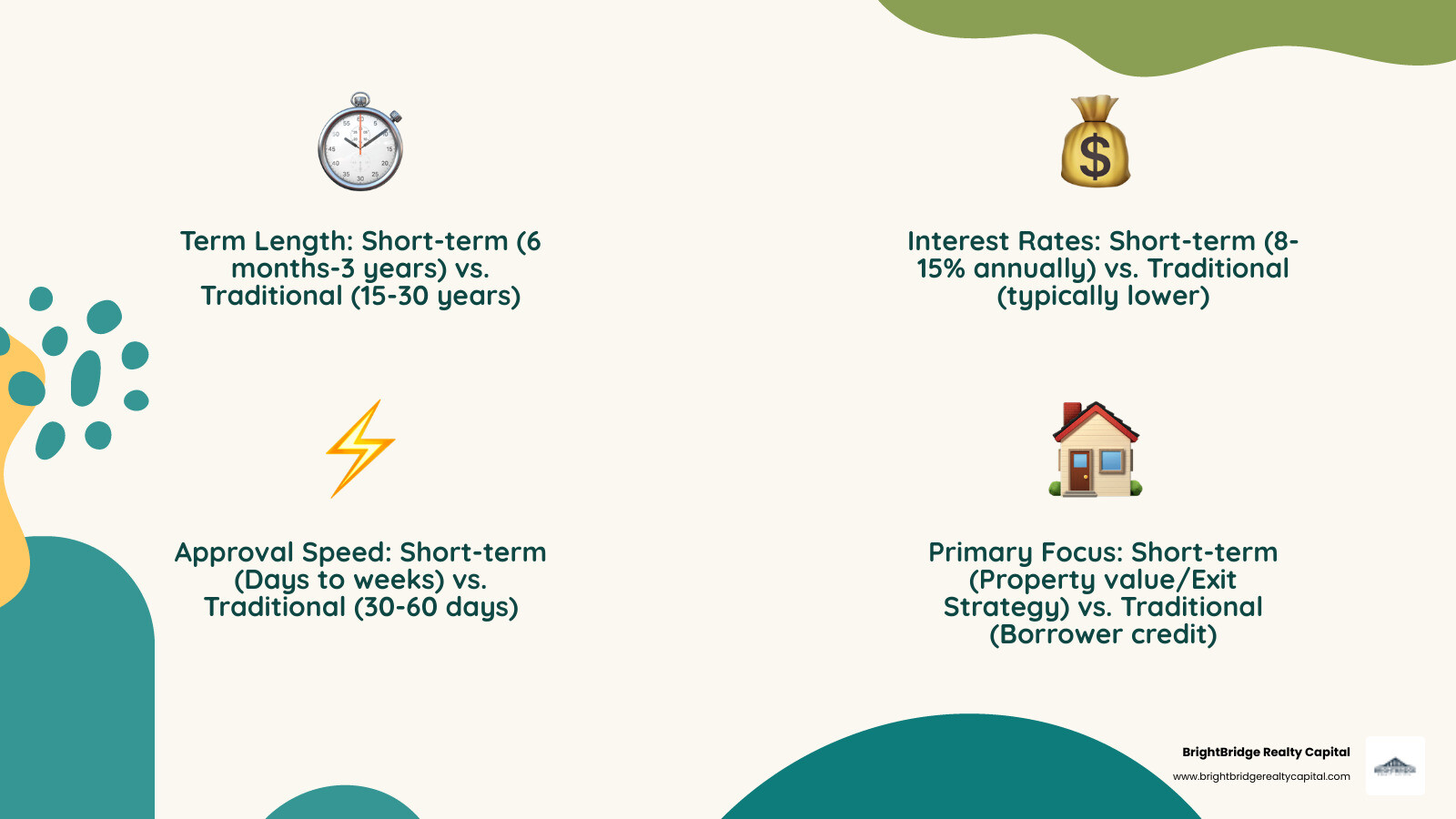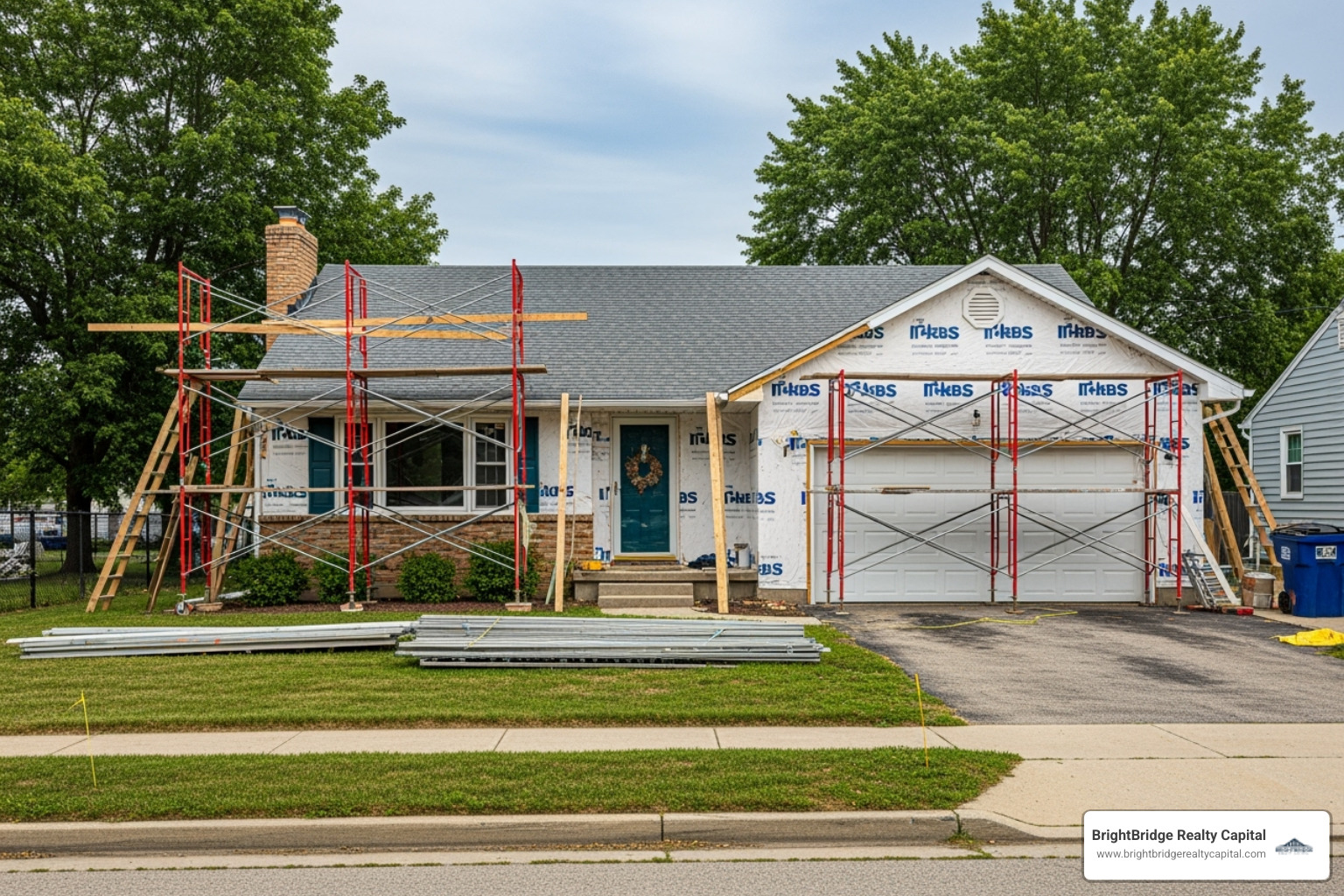Fast Cash for Property: Understanding Short-Term Real Estate Loans

Why Speed Matters in Today's Real Estate Market
A short term real estate loan is a financing solution for investors needing quick capital. Typically lasting 6 months to 3 years, these loans prioritize speed and flexibility over the long payment periods of traditional mortgages.
Key characteristics of short-term real estate loans:
- Term length: 6 months to 3 years (vs. 15-30 years for traditional mortgages)
- Interest rates: 8-15% annually (higher than conventional loans)
- Approval speed: Days to weeks (vs. 30-60 days for traditional loans)
- Primary focus: Property value and exit strategy over personal credit
- Common uses: Fix-and-flip projects, bridge financing, quick acquisitions
In today's competitive real estate market, timing is everything. Traditional mortgage processes can take 30-60 days, which is often too slow for motivated sellers or auction properties. Short-term loans fill this gap by providing capital in days or weeks, not months.
These loans are ideal for investors with clear exit strategies, such as a quick renovation and sale, or refinancing into long-term financing. A solid plan is essential for success.
As a loan officer at BrightBridge Realty Capital, I've helped many investors secure short term real estate loan financing for time-sensitive deals. My experience shows that prepared investors who understand these products gain a significant competitive advantage in fast-moving markets.

What Defines a Short-Term Loan?
Understanding what makes a short term real estate loan unique is essential. These loans are fundamentally different from the traditional mortgages you might be familiar with.
How They Differ from Long-Term Mortgages
Think of short term real estate loans as the sports car of real estate financing—built for speed and agility. Traditional mortgages are more like a reliable family sedan, designed for the long haul.
The most obvious difference is the loan term. A typical homeowner has a 30-year mortgage, while a short term real estate loan is usually for six months to three years. This shorter timeline means higher monthly payments, but you build equity rapidly and avoid decades of interest.
The underwriting focus is also completely different. Traditional lenders scrutinize your personal finances: credit score, employment history, and debt-to-income ratio.
In contrast, short term real estate loan lenders are more interested in the property value and your investment purpose. Your exit strategy—how you'll repay the loan—matters more than a missed credit card payment from two years ago.
This focus allows for dramatically faster funding speed. While traditional mortgages can take 30 to 60 days, we can often provide funding in days or weeks. This speed is a major competitive advantage when you find the perfect flip property or need to close quickly.
| Feature | Short-Term Real Estate Loans | Traditional Mortgages |
|---|---|---|
| Term Length | 6 months to 3 years | 15-30 years |
| Interest Rate | Higher (typically 8-15%) | Lower (3-7% historically) |
| Approval Speed | Days to weeks | 30-60 days |
| Primary Use Case | Investment properties | Primary residences |
Understanding the Costs: Interest Rates and Fees
While short term real estate loans have higher upfront costs, you're paying for speed and flexibility to seize opportunities others miss.
Interest rates typically range from 8% to 15% annually, reflecting the shorter timeline and higher perceived risk. These loans often come from private lenders rather than big banks.
Fees include origination fees and loan points, which can range from 2% to 10% of the loan amount (one point equals 1% of the loan). On a $300,000 loan, that's $6,000 to $30,000 in upfront fees.
Closing costs are similar to traditional transactions, running 2% to 5% of the loan amount for things like appraisal fees, legal fees, and title insurance.
Many short term real estate loans offer interest-only payments, which keeps your monthly cash flow manageable during a project. However, the entire principal is due as a balloon payment when the loan matures.
Some lenders include prepayment penalties, so always clarify this before signing. You don't want surprises if your flip sells faster than expected. The key is to run your numbers carefully to ensure your deal can cover all costs and still deliver a solid return.
Common Types of Short-Term Real Estate Loans
Not all short term real estate loans are the same. Think of them as tools in a toolbox—each designed for a specific job. Choosing the right one is key to a profitable deal.

Let's review the three main types of short-term financing that investors rely on most.
Bridge Loans: Bridging the Financial Gap
Imagine you've found a perfect investment property, but your current property hasn't sold yet. A bridge loan is designed to solve this exact timing mismatch.
A bridge loan provides temporary financing to cover funding gaps between transactions, allowing you to buy a new property before selling an existing one. These loans are perfect for buying before selling scenarios and typically run for 6 to 12 months, though terms can vary. The loan allows you to tap into the equity of your current property to finance the next purchase.
Interest rates for bridge loans during property transitions are often between 9.99% and 12.00%. While higher than traditional financing, the speed and flexibility they offer can be invaluable for time-sensitive deals.
Hard Money Loans: Asset-Focused Financing
Hard money loans focus on the property itself rather than your personal credit history. Provided by private lending groups, these loans prioritize the collateral focus of your deal.
Lenders evaluate the property's value and potential, a hard assets approach that allows you to secure financing even with imperfect credit or for unconventional properties. The main advantage is fast funding. Hard money lenders can close deals in days or weeks, which is crucial when competing for distressed properties or making cash-like offers.
Interest rates typically range from 8% to 15%, with closing costs around 2% to 5% of the loan amount. The higher cost is often justified by the potential return on properties that traditional banks won't finance.
Fix-and-Flip Loans
Fix-and-flip loans are a specialized type of hard money loan designed for rehabilitation projects. If you plan to buy a property, renovate it, and sell it for a profit, this is your ideal financing tool.
These loans are unique because they cover both purchase and rehab costs in one package. Lenders evaluate the property's After Repair Value (ARV)—what it will be worth after renovations are complete. The loan amount is based on a percentage of the ARV, ensuring you have enough capital for the entire project.
Fix-and-flip loans often use draw schedules, releasing renovation funds as you hit specific construction milestones. This protects both you and the lender. The structure is built around maximizing ROI by providing quick access to capital, allowing you to transform properties efficiently and realize profits sooner.
The Pros and Cons for Real Estate Investors
Weighing the advantages against the potential risks is crucial before using this type of financing.

Every financial tool has strengths and weaknesses. A short term real estate loan offers incredible advantages for certain strategies but comes with risks that every investor must understand.
The Key Advantages: Speed and Flexibility
The biggest benefits of a short term real estate loan are speed and flexibility. In a competitive market, these are essential for landing great deals.
Fast closings are where these loans shine. A short-term loan can close in days or weeks, while traditional mortgages take 30-60 days. This speed lets you make offers that are nearly as attractive as cash, giving you a significant edge. When a seller needs to close quickly, your ability to do so can lead to a better purchase price.
Flexibility is equally important. Traditional banks have strict guidelines, but short term real estate loan lenders focus on the property's value and your investment plan. This means you can finance unconventional properties that banks might reject, like a fixer-upper needing significant repairs. With less red tape, you work directly with decision-makers, making the process refreshingly straightforward.
Who Benefits from a Short-Term Real Estate Loan?
These loans are specialized tools for specific investors and situations:
- Real estate investors building rental portfolios or developing properties.
- House flippers whose business model depends on buying, renovating, and selling quickly.
- Developers who need to secure land or bridge financing for construction.
- Borrowers with less-than-perfect credit who have a solid deal but can't get traditional financing.
- Entrepreneurs needing quick capital for real estate-related business opportunities.
At BrightBridge Realty Capital, we work with all these investor types, understanding their unique needs.
The Risks and Disadvantages to Consider
While powerful, short term real estate loans require careful planning.
Higher costs are the most obvious drawback. Interest rates (8-15%) and origination fees are significantly higher than traditional mortgages. Delays in your project can be costly, as daily interest on a $150,000 loan can be $45 to $49.
The short repayment window creates pressure. You have a limited time to execute your plan and repay the loan, making a clear and realistic exit strategy essential.
Default risk is serious. If you can't repay the loan on time, you risk foreclosure, as the property secures the loan. This risk is amplified by the short timeline and higher payments. External factors like a drop in property values can also turn a good deal into a challenging one.
Managing these risks requires thorough preparation, realistic budgets, and contingency plans. The most successful investors we work with plan for the unexpected.
How to Qualify and Apply for a Short-Term Real Estate Loan
A step-by-step look at the application process, from preparing your documents to understanding what lenders prioritize for approval.
Ready to apply for a short term real estate loan? The process is faster than traditional financing because our focus is on your property and your plan.
What Lenders Look For in an Applicant
When we review applications at BrightBridge Realty Capital, we're asking: "Does this deal make sense, and does the investor have a clear path to success?"
The most important element is a strong exit strategy. We need to see exactly how you plan to repay the loan, whether it's by selling the property after renovations or refinancing into a traditional mortgage. Your plan should be specific and realistic, supported by comparable sales and a clear timeline.
Next is the property appraisal. For fix-and-flip projects, we focus on the After Repair Value (ARV)—what the property will be worth post-renovation. This figure helps determine the loan amount.
The Loan-to-Value (LTV) ratio is also key. Most lenders fund 60-70% of the property's current value, meaning you'll need a down payment of 20-35%. Your real estate experience is a plus, but a well-researched plan from a new investor can be just as compelling.
Preparing Your Application for a Short-Term Real Estate Loan
Getting your paperwork together is straightforward because we focus on the deal itself. Here's what you'll generally need:
- Purchase Agreement: Shows you have a deal under contract.
- Detailed Rehab Budget: A line-item breakdown of all renovation costs.
- Property Details: Address, square footage, and key features.
- Entity Documents: If you're using an LLC or other business entity.
- Clear Business Plan: Outline your timeline, renovation plans, marketing strategy, and backup plans.
- Financial Statements: Proof of funds for the down payment and monthly payments (e.g., bank statements).
At BrightBridge Realty Capital, our direct lending approach means no middlemen and closings often within a week. Being prepared is the key to a fast, smooth process.
Exploring Additional Financing Considerations
While short term real estate loans are powerful, it's wise to understand other financing options that can complement your strategy.
Portfolio Loan Options
If you're managing or acquiring multiple properties, portfolio loan options can be a great fit. Instead of getting separate loans for each property, you can bundle them under a single loan.
Portfolio loans offer flexible underwriting because lenders like us keep them on our books. This allows us to look at your entire investment strategy, not just individual properties. Managing multiple properties becomes much simpler with one payment and one set of terms. This relationship-based lending approach fosters a partnership that can grow with your portfolio, with customized terms that align with your cash flow and timeline.
Creative Structuring and Partnerships
Sometimes the best financing solution is created through strategic partnerships.
Joint ventures (JVs) are a popular approach. You might partner with someone who provides capital while you manage the project, or vice versa. The key benefit of a JV is sharing risk and reward, which allows you to take on bigger projects or learn from experienced partners.
We often help investors with structuring deals for unique scenarios, such as complex commercial projects or loans that need to convert from acquisition to construction financing. Other creative options include seller financing or lease-option arrangements. The goal is to match the financing structure to the specific opportunity.
At BrightBridge Realty Capital, our direct lending model allows us to be solution-oriented and move quickly on custom financing structures that don't fit a standard box.
Conclusion
Short term real estate loans are game-changers for serious investors. In today's market, the difference between landing a profitable deal and missing out often comes down to one thing: speed.
While your competition is stuck in the lengthy traditional mortgage process, you can be closing deals. However, speed without strategy is just expensive. Success hinges on a solid plan and a clear exit strategy.
The higher costs associated with these loans are the price of opportunity. When you can secure and flip a property quickly, the extra expense becomes a small investment for a significant competitive advantage.
At BrightBridge Realty Capital, we've built our business around this reality. We know you need a partner who understands urgency. Our fast closings, often within a week, and direct lending without intermediaries mean you can make offers with confidence.
We've seen investors transform their portfolios by using these tools strategically. The right financing opens doors that traditional mortgages keep shut. The market won't wait for your paperwork, but with the right partner, you won't need it to.
Ready to see how fast, flexible financing can accelerate your next project? Explore our fix-and-flip loan solutions and find why investors nationwide trust BrightBridge Realty Capital to turn their real estate visions into reality.



